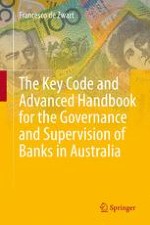2022 | OriginalPaper | Buchkapitel
8. Maximising the ‘Default Standard’ of Shareholder Value
verfasst von : Francesco de Zwart
Erschienen in: The Key Code and Advanced Handbook for the Governance and Supervision of Banks in Australia
Verlag: Springer Nature Singapore
Aktivieren Sie unsere intelligente Suche, um passende Fachinhalte oder Patente zu finden.
Wählen Sie Textabschnitte aus um mit Künstlicher Intelligenz passenden Patente zu finden. powered by
Markieren Sie Textabschnitte, um KI-gestützt weitere passende Inhalte zu finden. powered by
